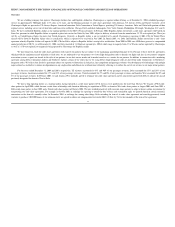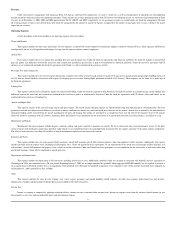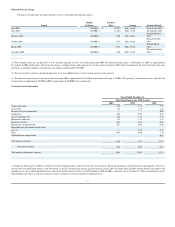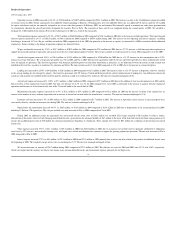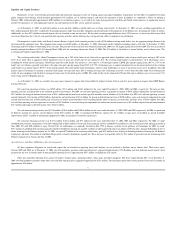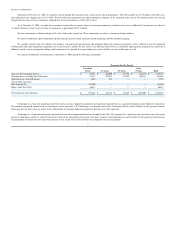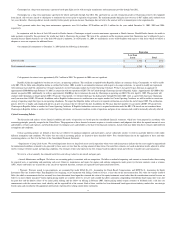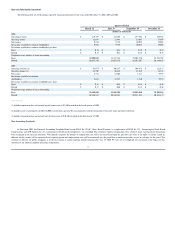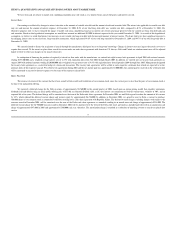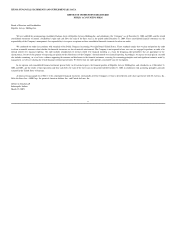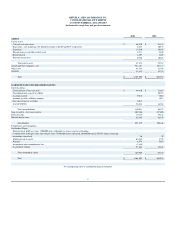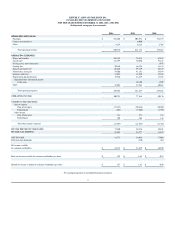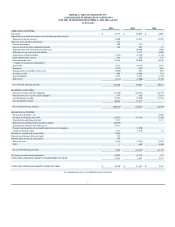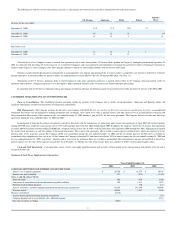Frontier Airlines 2004 Annual Report Download - page 44
Download and view the complete annual report
Please find page 44 of the 2004 Frontier Airlines annual report below. You can navigate through the pages in the report by either clicking on the pages listed below, or by using the keyword search tool below to find specific information within the annual report.
Chautauqua has a long
-
term maintenance agreement based upon flight activity with an engine manufacturer and maintenance provider through June 2012.
Chautauqua has a long
-
term maintenance agreement for wheels and brakes through June 2014. The agreement has an early termination penalty if Chautauqua removes the equipment
from aircraft, sells or leases aircraft to a third party or terminates the services prior to expiration of agreement. The maximum penalty during the first two years is $0.7 million and is reduced every
two years thereafter. Chautauqua did not record a liability for this penalty provision because Chautauqua does not believe the contract will be terminated prior to the expiration date.
Total payments under these long
-
term maintenance agreements were $18.1 million, $27.0 million and $35.1 million for the years ended December 31, 2002, 2003 and 2004,
respectively.
In conjunction with the lease of Saab 340 aircraft to Shuttle America, Chautauqua assigned a certain maintenance agreement to Shuttle America. Should Shuttle America be unable to
make payments required by this agreement, the vendor may look to Chautauqua for payment. The term of the agreement and the maximum amount that Chautauqua may be obligated to pay is
uncertain because Shuttle America's use of the Saab 340 aircraft is unknown. As of December 31, 2004, we maintained a reserve of $6.0 million with respect to such losses which we believe is
adequate to cover our exposure for additional losses.
Our commercial commitments at December 31, 2004 include the following (in thousands):
Cash payments for interest were approximately $26.7 million in 2004. Tax payments in 2004 were not significant.
Republic Airline has applied for, but does not yet have, an operating certificate. This certificate is required before Republic Airline can commence flying. Consequently, we will be unable
to fly ERJ
-
170s for Delta unless Republic Airline is certified. In October, 2004, in order to accommodate American with respect to its scope restrictions, we agreed to modify our Agreement
with American to preclude the continued use of larger regional jets on our Chautauqua Airlines Air Carrier Operating Certificate. We have also agreed to pay American an aggregate of
approximately $500,000 through February 19, 2005, in connection with our operation of ERJ
-
170s for United through Chautauqua instead of Republic Airline. Approximately $291,000 of this
amount was paid in 2004. Additionally, we will pay approximately $36,000 per day to American for each day Chautauqua is operating any ERJ
-
170s after April 21, 2005. This payment will
continue until Chautauqua no longer operates ERJ
-
170 aircraft. Consequently, we will most likely pay this daily penalty through November 2005. Also, as agreed with American, Chautauqua
can fly no more than 18 ERJ
-
170 aircraft. In addition, unless Republic Airline receives its certification or we acquire another Air Carrier Operating Certificate, we will be unable to execute our
strategy of operating single fleet types in our operating subsidiaries. We expect that Republic Airline will receive its required certification on or before the end of August 2005. The certification
process, however, is lengthy and complicated and we can give no assurance that we will meet this date. In addition, the FAA may limit how quickly we can transfer all ERJ
-
170 aircraft from
Chautauqua to Republic Airline or another Air Carrier Operating Certificate. If Republic Airline does not receive its required certification and if the ERJ
-
170 aircraft are not transferred from
Chautauqua to Republic Airline or another Air Carrier Operating Certificate, our financial condition, results of operations and price of our common stock could be materially adversely affected.
Critical Accounting Policies
The discussion and analysis of our financial condition and results of operations are based upon the consolidated financial statements, which have been prepared in accordance with
accounting principles generally accepted in the United States. The preparation of these financial statements requires us to make estimates and judgments that affect the reported amount of assets
and liabilities, revenues and expenses, and related disclosure of contingent assets and liabilities at the date of our financial statements. Actual results may differ from these estimates under different
assumptions and conditions.
Critical accounting policies are defined as those that are reflective of significant judgments and uncertainties, and are sufficiently sensitive to result in materially different results under
different assumptions and conditions. We believe that our critical accounting policies are limited to those described below. For a detailed discussion on the application of these and other
accounting policies, see Note
2 in the Notes to the Consolidated Financial Statements.
•
Impairments to Long
-
Lived Assets. We record impairment losses on long
-
lived assets used in operations when events and circumstances indicate that the assets might be impaired and
the undiscounted cashflows estimated to be generated by those assets are less than the carrying amount of those items. Our cash flow estimates are based on historical results adjusted to reflect
our best estimate of future market and operating conditions. Our estimates of fair value represent our best estimate based on industry trends and reference to market rates and transactions.
We review, at least annually, the estimated useful lives and salvage values for our aircraft and spare parts.
•
Aircraft Maintenance and Repair. We believe our accounting policy is consistent with our competitors. We follow a method of expensing such amounts as incurred rather than accruing
for expected costs or capitalizing and amortizing such costs. However, maintenance and repairs for engines and airframe components under power
-
by
-
the
-
hour contracts (such as avionics,
APUs, wheels and brakes) are accrued for as the aircraft are operated; therefore, amounts are expensed based upon actual hours flown.
•
Warrants. Warrants issued to non
-
employees are accounted for under SFAS No. 123, Accounting for Stock
-
Based Compensation, and EITF 96
-
18, Accounting for Equity
Instruments That Are Issued to Other Than Employees for Acquiring, or in Conjunction with Selling, Goods or Services, at fair value on the measurement date. Fair value for warrants issued to
Delta (for which a measurement date has occurred) have been determined based upon the estimated fair value of the equity instrument issued rather than the consideration received because we
believe it is more reliably measured. Various option pricing models are available; however, we have used a model that allows continuous compounding of dividends which begins three years after
the grant date and the dilutive effects of our initial public offering and the follow
-
on offering in February 2005. Option pricing models require estimates of dividend yield, a risk free rate
commensurate with the warrant term, stock volatility and the expected life of the warrant. Each of these variables has been determined based upon relevant industry market data, our strategic
business plan and consultation with appropriate professionals experienced in valuing similar equity instruments.
Expiration
Less than
1 year
Total
Letters of credit
$
4,782
$
4,782
Total commercial commitments
$
4,782
$
4,782
34


